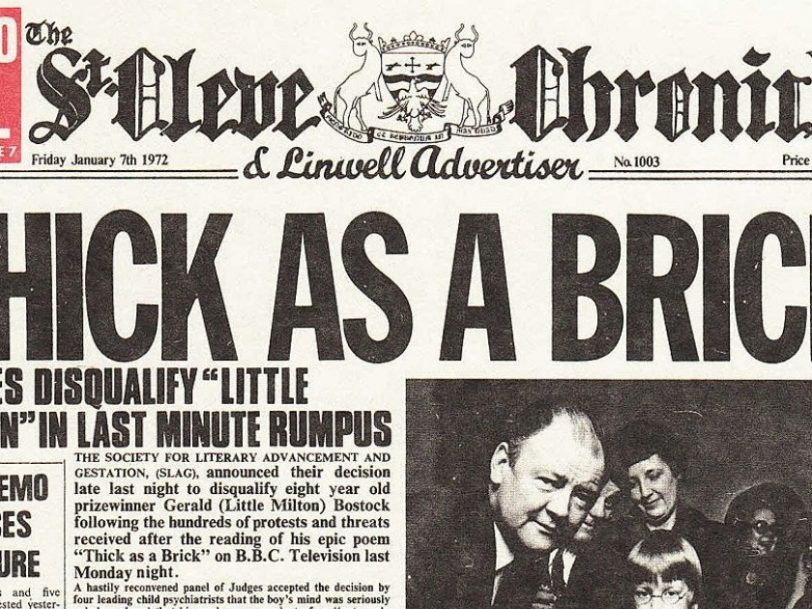Following the storming success of his band’s 1971 opus, Aqualung, Jethro Tull’s frontman, Ian Anderson, found himself both tickled and bemused by the sheer absurdity of progressive rock. Mindful of the pretentious pitfalls of a genre that could be grandiose, lengthy and indulgent, Anderson was keen to inject more of a sense of humour into proceedings for the group’s next album, Thick As A Brick.
Listen to ‘Thick As A Brick’ here.
Though they were prog-rock bedfellows, Jethro Tull approached their fifth record with a tongue-in-cheek sensibility, framing it as a musically ambitious satire on the British class system, with comedic undertones. “We’re talking about an era when Monty Python was really successful,” Anderson later said, “and we had a similar sense of humour to them.” Coasting away from the Flying Circus in a blimp of their own making, Jethro Tull ensured that Thick As A Brick was a surreal and epic flight that celebrated their fondness for schoolboy japes while leading them to discover their very own holy grail.
“We were spoofing the idea of a concept album”
Combining highfalutin musical ideas while rehearsing in a mobile studio owned by The Rolling Stones, the band put flesh on the bones of a two-part suite of continuous music – each one occupying over 20 minutes on each side of vinyl. Aiming to tell the story of a fictitious 12-year-old schoolboy, Thick As A Brick was full of the dazzling wordplay, riddles and frantic tempos of the best Jethro Tull songs, bolstered by gleeful anti-Establishment swipes at toffee-nosed bores. “We were spoofing the idea of a concept album,” Anderson said, “but in a fun way that didn’t totally mock it.”
Committing to prog’s tried-and-tested formula of gleefully long compositions and complex time signatures, the band finalised the record in December 1971 at Morgan Studios, in North London, and each musician fully bought into Anderson’s comical vision. “I came up with the idea of basing the whole thing around a fictitious schoolboy called Gerald Bostock (who was also known as Little Milton) and a poem he’d supposedly written,” the singer explained. This concept allowed Anderson to toy with what he called “the era of surreal British humour” they group had grown up with, mining the absurd irreverence of Spike Milligan’s Goon Show and the sketch-based lunacy of Monty Python’s class-based iconoclasm.
“I think we all had that sort of schoolboy humour throughout the album,” guitarist Martin Barre recalled. “We were all pranksters, all in a very silly state of adult development.” Musically, however, Jethro Tull were as serious-minded as ever, creating for Thick As A Brick a watertight arrangement to which each band member contributed hugely, resulting in the band’s most innovative undertaking to date. “We worked together on the arrangements and so everyone probably had an equal amount of input,” Anderson said.




